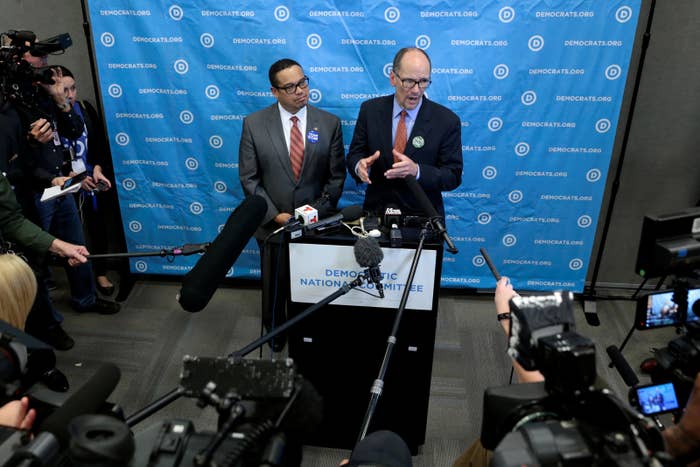
ATLANTA — One of the protesters in the Atlanta Convention Center, angry and upset over the vote, directed his chants at the atrium full of Democrats.
“Party for the people!” Curtis Ries yelled. “Party for the people!”
Tom Perez’s narrow victory over Keith Ellison in election to chair the Democratic National Committee — a race progressives considered an urgent existential choice between the “establishment” and “grassroots” — did not spur the massive backlash DNC officials feared in the end. But Ellison's defeat did leave some young, liberal activists with new disdain, as 28-year-old Ries put it, for “institutional leadership" — for the party, for elected officials, the 447 DNC members with a say in the chair.
Liberal support for Ellison, a Minnesota congressman beloved by Bernie Sanders voters, “was a very clear message, given to the party by its progressive base, by young people,” Ries said. "The DNC instead decided that they knew better.”
The same frustration cycled through social media into this week: #DemExit hashtags, Facebook statuses on quitting the party, a Medium post for "disappointed progressives" advising activists to leave behind an organization of “paying, craved, cynical lip-service” and leaders who live to “serve the establishment.”
A party chair race rarely decides the direction of a political movement, and this one didn't. Perez, the 55-year-old former labor secretary, is taking the helm of a party still contending with ideological differences and unresolved questions about how Democrats will handle pressure from the left to resist President Trump at every turn.
Since the vote, Perez and Ellison have put forth a united front, making stops in Washington on Tuesday for the first time as chair and deputy chair of the DNC.
But in the wake of a the long-fought chair's race, where Perez was cast as an insider, he is also facing a group of young and progressive grassroots activists and voters who view Democratic Party politics with distrust, unease, or from a remove.
Jeff Weaver, Bernie Sanders’ former campaign manager, a Perez critic, and supporter of Ellison’s, said that Saturday's vote had likely reinforced that distance.
“I think there are a number of people now who have increased skepticism about the party,” Weaver said after the DNC vote. “It is incumbent on Tom Perez and the rest of the DNC to reach out to people who feel separated from the party, bring those people in, and let them know that the party is a place that welcomes them.”
Sanders himself told CNN on Sunday that Perez would "have to change is to figure out how we elect national Democratic leaders," adding that he was "not quite impressed with the process that exists."
“If we do not bring this new generation into institutional politics now, they may never get there,” said former DNC chair Howard Dean, a backer of another candidate, Mayor Pete Buttigieg of South Bend, Ind., who bowed out before voting. “And that would be the end of the Democratic Party as a functional institution.”
Adam Green, the co-founder of the Progressive Change Campaign Committee, one of several liberal groups that backed Ellison, said the congressman's experience as an organizer made him an ideal figure to close the gaps on the left. "To actively build bridges between the Democratic Party and the grassroots base," he said.
Of Perez, Green said, “This was not an ideological battle."
Perez, he noted, would have been PCCC's first choice for U.S. attorney general had Clinton won.
The left’s objection to Perez has to do in part with his entry into the race, and is centered not on policy but proximity to the Democratic Party establishment.
The week after the presidential election, Ellison launched his chair’s bid and quickly secured top endorsements from Sanders and House and Senate Democrats, positioning his campaign as the link between grassroots activists and Washington.
One month later, Perez got in the race, followed by news reports declaring him the preferred candidate of Barack Obama. When Joe Biden endorsed weeks later, Sanders released a statement “Do we stay with a failed status-quo approach?"
Together with his role as a prominent surrogate for Hillary Clinton in last year’s campaign, the “establishment” label stuck. (Perez's resume is less commonplace: He is the first Latino chair of the DNC, a civil rights lawyer, and has only held public office once, on the Montgomery County Council in his home state of Maryland.)
In the three final days before this weekend's vote, as the candidates made their final appeals to the DNC's 447 voting members in the meeting rooms and lobby bar of Atlanta’s Westin Peachtree Plaza hotel, there were warnings among progressives that a Perez victory would incite a revolt among the already alienated left wing.
Weaver, the former Sanders manager, made a splash in a MSNBC hit where he called Perez’s candidacy “divisive” and referred to him as a “candidate of the inside” whose election would “send a horrible message to millions and millions of people.” A Glenn Greenwald column in the Intercept called him a party “functionary.”
When voting ended, the only brief protest inside the Atlanta Convention Center came from Ries and the other Ellison supporters.
The DNC race, the first contested chair’s vote since the 1980s, spanned 15 weeks and drew a total of 11 candidates. Perez and Ellison, the frontrunners from the start, went through two long and tense rounds of votes on Saturday before the former labor secretary clinched the majority of votes from DNC members.
